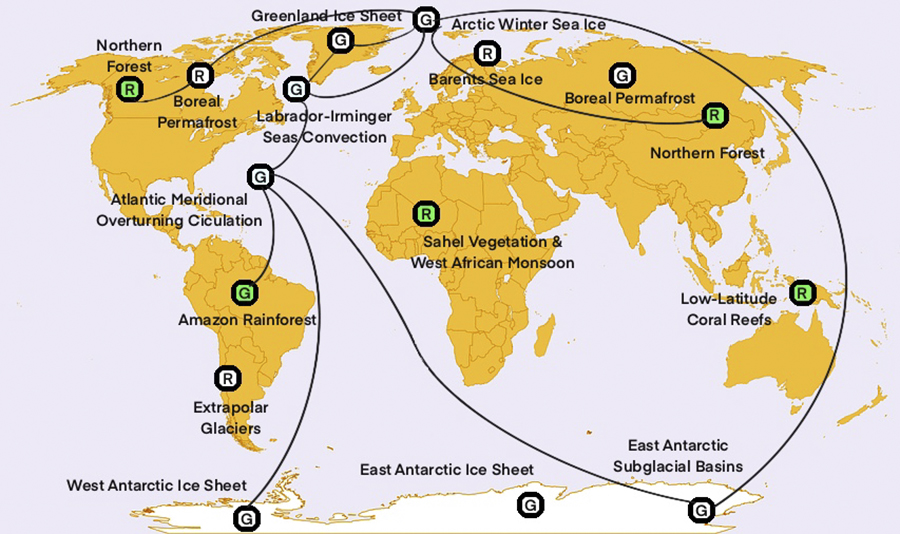Tipping elements
Tipping elements are regions across the globe that are vulnerable to climate change, capable of sudden drastic change. Research has shown that between them they interact on a global scale. They are key components of interconnected earth systems that maintain stability as global temperatures have increased but are vulnerable to feedback loops which can negatively impact temperatures and accelerate change.
It is generally proposed that there are 16 elements globally, which jointly effect earth systems. They are referred to as tipping elements because they are impacted by tipping points at various global temperature increases and capable of significant behaviour change.
The majority of these elements are ice masses, whose melting will impact numerous systems as well as sea level rise. The next most important are made up of biosphere components or ecosystems such as the Amazon rainforest and the final components are circulation systems that help control temperature through oceanic thermal movement.
Some of these tipping elements are described by PIK as acting on a global scale (G) whilst others, although impacting global systems, act more on a regional scale (R) as indicated above (image based an original by PIK, source referenced as Armstrong McKay et al., Science (2022))
The 16 tipping elements are noted as being:
- Greenland Ice Sheet - becoming thinner and losing height, thus accelerating warming.
- Arctic Winter Sea Ice - a thin layer of frozen water that where lost can accelerate heat absorption.
- Barents Sea Ice - similar to above but impacted by warm water from the Atlantic.
- Boreal Permafrost (abrupt thaw) - releases carbon but can accelerate as upper levels are lost.
- Boreal Permafrost (collapse) - releases carbon compounds that could lead to increased warming.
- Extrapolar Glaciers - certain temperature thresholds accelerate glacier loss leading to water shortage.
- West Antarctic Ice Sheet - potentially a self-perpetuating feedback loop causing accelerated ice loss.
- East Antarctica: Subglacial Basins - As above causing significant sea level rise.
- East Antarctic Ice Sheet - as above impacting the largest frozen water source.
- Atlantic Meridional Overturning Circulation - ice melt can slow down thermal circulation.
- Labrador-Irminger Seas Convection - potential cooling but will significantly impact weather patterns.
- Northern Forests (southern dieback) - warming causing higher risk of dieback and loss of sequestration.
- Northern Forests (northern expansion) - warming causing forest expansion and ice accelerating warming.
- Low-latitude Coral Reefs - water temperatures and other impacts casing die off of the corals.
- Sahel Vegetation & West African Monsoon - less clear but fundamental changes to regional vegetation.
- Amazon Rainforest - warmer climate, reduced precipitation, higher dieback and fire risks.
For further information and detailed explanation, visit : https://www.pik-potsdam.de/en/output/infodesk/tipping-elements
[edit] Related articles on Designing Buildings
- Climate change science.
- Climate feedback.
- Chlorofluorocarbons CFCs.
- COP21 Paris 2015.
- Earth overshoot day.
- Environmental legislation.
- Feedback loops.
- Global warming and the tipping point precipice.
- ICE launches engineering route map to deliver UN SDGs.
- Reflexivity.
- Sustainable development.
- Sustainability.
- Tipping point.
[edit] External references
- Johan Rockström, Director of the Potsdam Institute for Climate Impact Research at the World Economic Forum.
- https://www.pik-potsdam.de/en/output/infodesk/tipping-elements
- Lenton, Timothy M., et al. "Climate tipping points—too risky to bet against." Nature, (2019): 592-595.
- Wunderling, N., Donges, J. F., Kurths, J., & Winkelmann, R.. "Interacting tipping elements increase risk of climate domino effects under global warming." Earth System Dynamics, 12(2),(2021): 601-619.
- Steffen, Will, et al. "Trajectories of the Earth System in the Anthropocene." Proceedings of the National Academy of Sciences 115.33 (2018): 8252-8259.
- Lenton, Timothy M., and Hans Joachim Schellnhuber. "Tipping the scales." Nature Climate Change 1.712 (2007): 97-98.
- Lenton, Timothy M., et al. "Tipping elements in the Earth's climate system." Proceedings of the national Academy of Sciences 105.6 (2008): 1786-1793.
- Armstrong McKay et al. “Exceeding 1.5°C global warming could trigger multiple climate tipping points.” Science 377(6611), (2022).
Featured articles and news
UKCW London to tackle sector’s most pressing issues
AI and skills development, ecology and the environment, policy and planning and more.
Managing building safety risks
Across an existing residential portfolio; a client's perspective.
ECA support for Gate Safe’s Safe School Gates Campaign.
Core construction skills explained
Preparing for a career in construction.
Retrofitting for resilience with the Leicester Resilience Hub
Community-serving facilities, enhanced as support and essential services for climate-related disruptions.
Some of the articles relating to water, here to browse. Any missing?
Recognisable Gothic characters, designed to dramatically spout water away from buildings.
A case study and a warning to would-be developers
Creating four dwellings... after half a century of doing this job, why, oh why, is it so difficult?
Reform of the fire engineering profession
Fire Engineers Advisory Panel: Authoritative Statement, reactions and next steps.
Restoration and renewal of the Palace of Westminster
A complex project of cultural significance from full decant to EMI, opportunities and a potential a way forward.
Apprenticeships and the responsibility we share
Perspectives from the CIOB President as National Apprentice Week comes to a close.
The first line of defence against rain, wind and snow.
Building Safety recap January, 2026
What we missed at the end of last year, and at the start of this...
National Apprenticeship Week 2026, 9-15 Feb
Shining a light on the positive impacts for businesses, their apprentices and the wider economy alike.
Applications and benefits of acoustic flooring
From commercial to retail.
From solid to sprung and ribbed to raised.
Strengthening industry collaboration in Hong Kong
Hong Kong Institute of Construction and The Chartered Institute of Building sign Memorandum of Understanding.
A detailed description from the experts at Cornish Lime.

























Comments
[edit] To make a comment about this article, or to suggest changes, click 'Add a comment' above. Separate your comments from any existing comments by inserting a horizontal line.